#korean etymology
Text
I've noticed something odd about Korean language...
Let's compare a simple sentence in Korean, Arabic, Turkish and Hebrew.
Korean

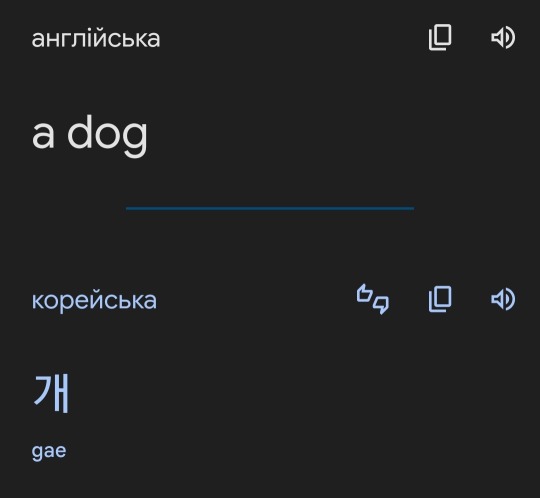
A dog and a cat
Gaewa goyang-i
Noun + conjunction + noun
Arabic


A dog and a cat
Kalb waqta
Noun + conjunction + noun
Turkish

A dog and a cat
Bir köpek ve bir kedi
Noun + conjunction + noun
Hebrew
No transcription, but you can hear it: וְ [ve] - and, כלב - dog, חתול - cat.
Did you noticed something? Yes, it's conjunction - they all are suspiciously similar: wa or ve. Ok, Arabic and Hebrew belong to Semitic language family, so ve and wa are cognates. Arabic always has been the most important language of Islam, so Turkish ve is a loanword from Arabic. But what about Korean? Korean wasn't influenced by Semitic or Turkic languages, there's no information about etymology of 와 (wa), except that it was 果 (*-kwa) in Old Korean and definitely not a loanword from Old Chinese.
Damn, it makes me believe in Nostratic theory!
#language#langblr#langblog#korean language#arabic language#hebrew#Turkish language#interesting#curious#etymology
91 notes
·
View notes
Text
Oh this is also an interesting thing about the Hanja in ORV Characters' names. 劉 gets simplified to 刘 on the mainland to approximate the meaning art "文" of the knife"刂"。 This shows it's meaning of slaughtering/killing. But to break down the traditional form Korean uses as hanja, you have the 4th earthly branch of daybreak/dawn 卯 (like on old Chinese clock it is rabbit hour, ~5-7am), metal/gold 金, and knife again.
This is pretty interesting bc like 卯's pictographic origin is an animal/sacrifice being split in two/ cut down the middle so 劉 kind of looks like metal falling through and cutting an animal in half and then knife, so yeah literally slaughter. But also 金 is the Hanja for family name 김... So in that context Yoo Joonghyuk's name has Kim Dokja's surname inside of it being used to slaughter an animal... So the idea that on the whole Yoo Joonghyuk is this weapon, this fierce killer, but that he is in some ways also an animal of slaughter, a sacrifice to sustain KDJ... Kinda cool if intentional.
+ I've talked about previously that the role of YSA is also one where she is grappling with an archetype of Supporting character that lacks agency over plot despite knowledge of it, which she is only able to break free from in the epilogues... It's interesting then to see Yoo as implying a supporting role/ as a sacrifice to the main character's story...
#orv#orv spoilers#ok i only know enough korean by now to know that the way we spell yoo and such is non-standard but RT has given me these Habits ok#i prommy I know that its 유 i prommy#basis of any of my language discussion is my knowledge of chinese btw#which is just about good enough to read classical references with the help of like 3 dictionaries lol#though it seems kind of vague i wanted to mention 刘 sometimes is referred to as an axe but the text of that i think is this guy calls his#axe 刘 so its unclear to me if its just a guy calling his sick axe 'slaughter' or if its a Type of axe#etymology#chinese language#korean language
37 notes
·
View notes
Text
I read a book about the history of hanok (traditional Korean housing) and find out that the word 집 (家, hanja is read as 가) literally means “family pig”. Apparently, in the past, snakes often invaded houses and owners tried to stop them by raising pigs, the natural enemies of snakes. From this meaning the word 가족(家族), which means “home” or “family”, was created.
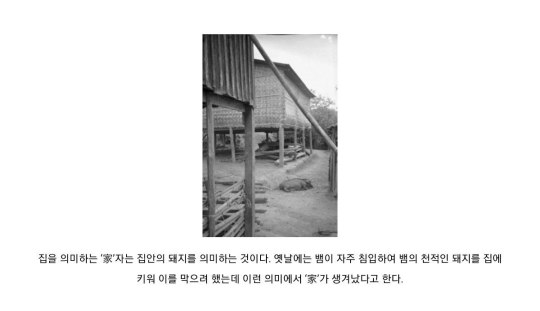
2 notes
·
View notes
Text
It's nice to ask questions here!
I am hoping for a response about what kind of books to learn general entomology and structures of grammar for any language!
I am trying to make up my own language!
Thanks!
#linguistics#etymology#ask#question#academic#academia#english#language#languages#books#book#reader#learner#student#college#university#languagelover#booklover#literature#arabic#chinese#russian#hindi#french#german#spanish#Norwegian#japanese#korean#Scandinavian
0 notes
Text
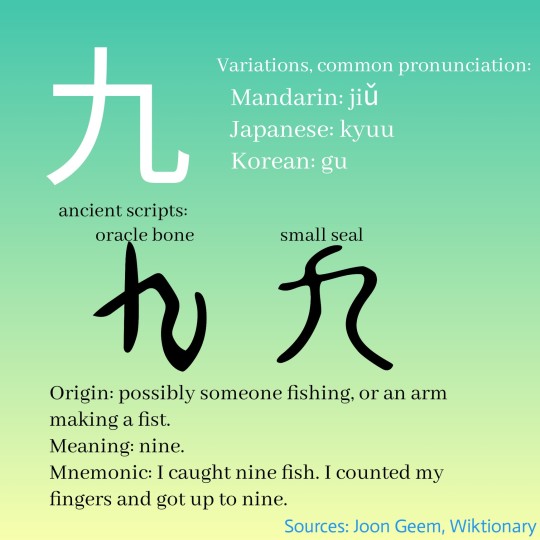
I'm still alive. Trying to get back into kanji. I love you all. Please say hi if you're not a bot.
Also check out Joon Geem's book on Chinese character cognates and Wiktionary. They have so much more information. Great resources if you're learning one of the languages and want your skills to transfer to the others.
0 notes
Text
7/25/23
this morning i was officially instructed to stop all C&C work because there was “a development” last week. no further elaboration. but then my (hbomb voice: former) not-supervisor took me to lunch and it turns out if you eat food weird in front of someone they will ask questions and now i think she’s worried i’m gonna kill myself. which i prommy i’m not you guys who would finish this sick ass chart i’m making
on that note why are the international credits So Shit. dub says one thing, subs say another, credits say the first thing again but then they change? So DT is Doble Dilema and Doppler Morfer in the Latin American version, i guess.
gasp
two of them. they planned this
#daily clare#i have a lot of extra time to kill at work now so i guess i'm out of excusesfor not learning to read thai & korean#they're just last bc i've done the other shit before#at least tangentially#for some reason thai and korean don't come up a lot in my etymology quests#go figure#ctj7
1 note
·
View note
Text
바람을 피우다
바람을 피우다 means "to cheat on, to be unfaithful". The first word 바람 means "wind", and the second word 피우다 means "to blossom, to ignite, to start a fire/smoke".
How do you "start" a wind/breeze? And how does that in the end correlate with cheating?
I don't have the answers yet, but leaving it here for future note.
1 note
·
View note
Text
misogyny in linguistics
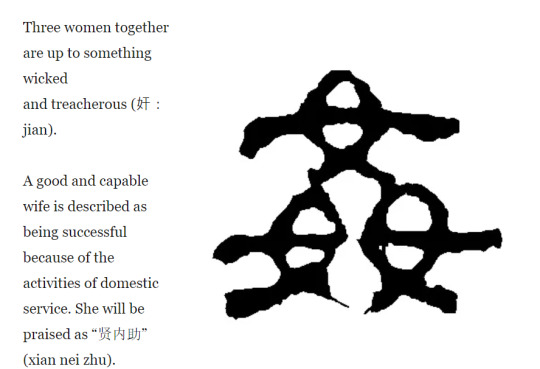
everything containing “ 女 “ (female) in chinese character etymology means something negative, cunning, devious, dark, or to indicate a servant. studying and knowing all those characters sickens me to the core. confuscianism furthered this in east asia weakening women’s rights - before confuscianism, korean dynasties had female kings and some property rights.
though we often use different chinese characters in each cases, china - korea - japan
screenshots source
the origin of the “female” character is a woman kneeling
in other explanations in confuscian texts, it says it is an image of a person kneeling with their neck in a pillory
on the contrary, the letters for “man” 男 is a person with the power 力 to feed 10 十 (shi) 口 (gou) mouths= family
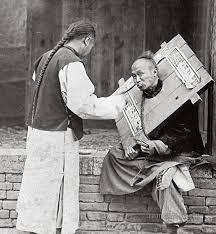

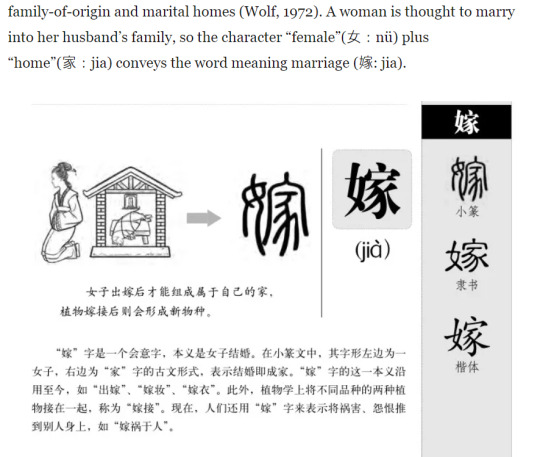
Wife as housemaid
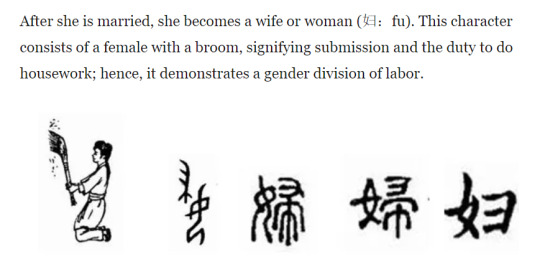
a woman outside a home(under her husband) is not safe
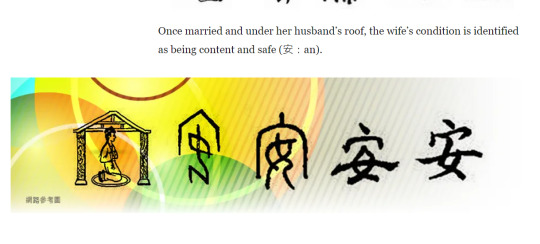
women with other women are always plotting
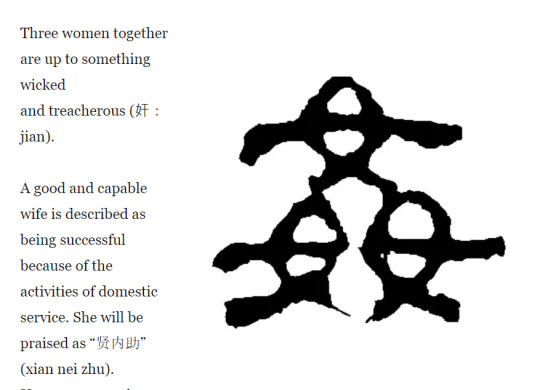
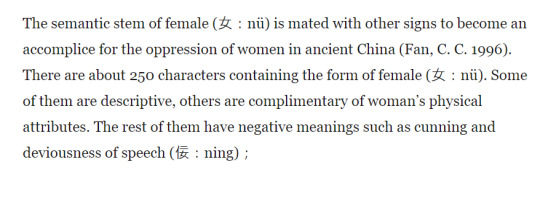
a man is allowed to have multiple wives, especially if she does not bear children: but he does not generally need justification. a women should never be jealous, jealousy (contains chinese character for female) is one of the 7 sins that husbands could banish, or beat their wives for
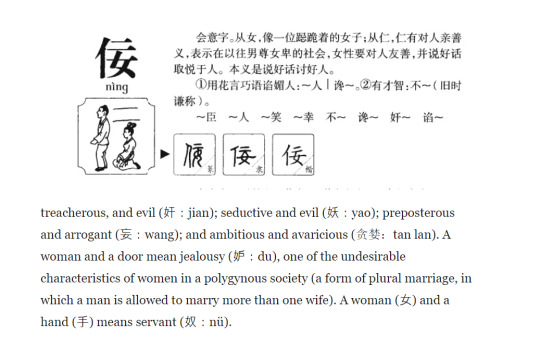
women + hands = servant
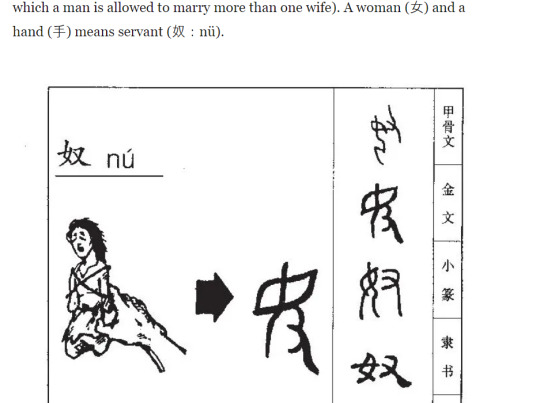
add fire onto the mix of the same characters of “servant”, you got “anger”
a lot of negative emotions in chinese characters are associated with symbols of women
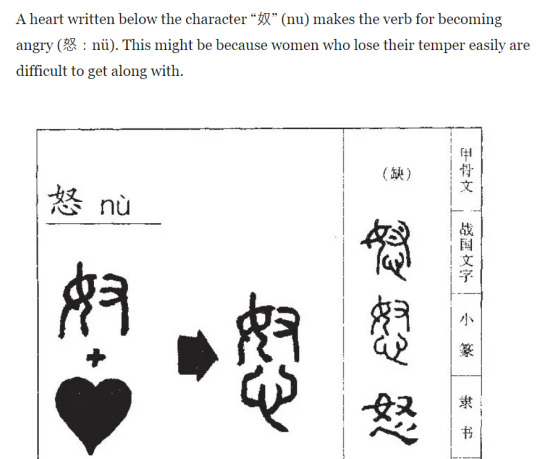
“Power” : women subjugated under a weapon

fraught mentions of female inferiority
남존여비 is a word often brought up in korean culture, as in males are precious and respectable “ 尊 ” and females are inferior by birth “ 卑 “ . Men are high, women are low. Gentlemen comes first
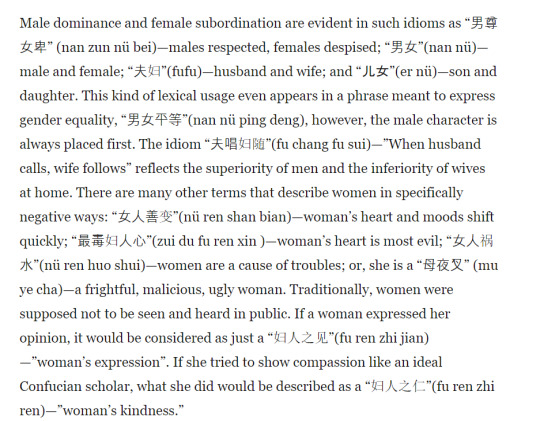
https://bild-lida.ca/educationalsociolinguistics/uncategorized/womens-oppression-and-chinese-characters/
嫌 for extreme “hate” = women
adultery = dark cunning thing that women do
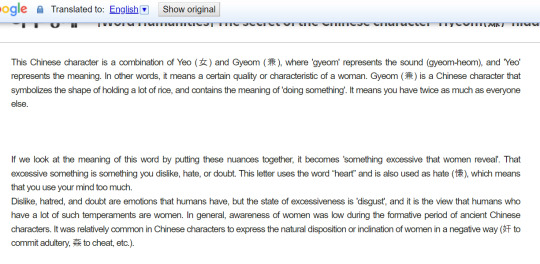
not all chinese characters with “women” have bad meanings! Some have positive meanings soch as detailing women’s looks or her docility
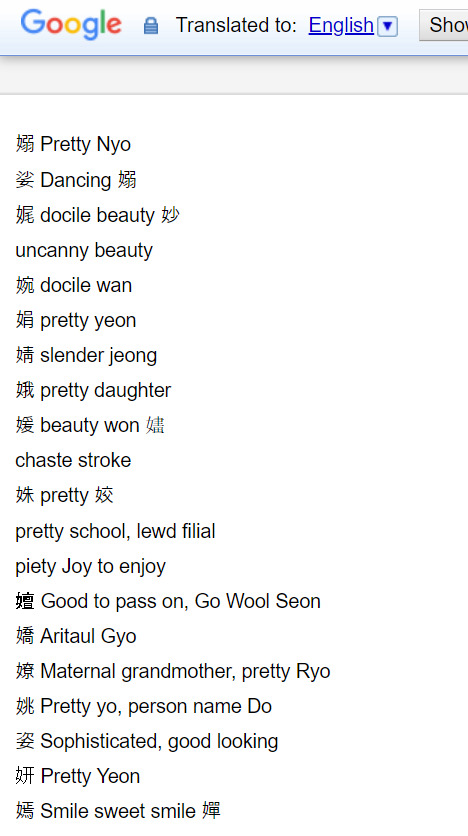
there are few if not zero chinese characters with the male “ 男 “ used inside a character contrary to the female “ 女 “ as a descriptor.
#i wanted to put chinese idioms here but guess that some idioms are same in every country#theres the exact same word for word ancient saying in chinese#korean italian and russian#you should beat women once in a while to subdue them#if women get power the world crumbles#etc#the tidbit about hens crowing bringing the house down#(cuz roosters aka men should rule not women=hens/cats#are the same in scottish proverbs?#Asian languages on the other hand? Uh good luck understanding a single word...#misogyny#mine
289 notes
·
View notes
Text
A brief introduction
Hello! 👋🏻
I'm not new to tumblr or langblr (you may know me as nordic-language-love), but I've decided to make a new blog for a whole host of reasons. And it's only courteous to have an introduction post when ones makes a new blog, isn't it?
👩🏻 You can call me Victoria
🎂 I'm in my 30s
🇯🇵 Originally I'm from the UK, but I currently live in Japan (Tohoku) where I teach English
🇳🇴 Learning Norwegian and Japanese. Japanese is currently my main focus for obvious reasons, but Norwegian will always be my fave <3
🗣 Other languages I'm interested in: Finnish, Icelandic, Spanish, Irish, Korean, Ukrainian, Tswana, Cornish and French
💬 Big linguistics fan too (etymology my beloved)
📚 I'm an aspiring bookworm. My favourite genres are fantasy and sci-fi (with a lil YA sprinkled in there). Find my 2024 TBR here.
📝 I also write! Getting something published someday would be nice, but I'm more focused on just having fun. I write primarily fantasy.
🩰 I practice yoga (intermediate level) and ballet (total beginner)
🧠 I'm neurodivergent. I have no official diagnosis yet but I have been referred for an assessment. I'm 99% sure I have ADHD (probably combined, possibly just inattentive) and autism's been suggested as well.
✉️ I'm shit at replying to messages. If I never get back to you please don't take it personally!
More about this blog
This blog is gonna be a bit of a mix of all my hobbies and interests because I can't be bothered to run like 5 different sideblogs anymore. However, my main interests that I'll be posting about are languages and reading.
I have a fitblr for my diet and fitness shenanigans! You can follow me on @flyingfitandsugarfree
I go through phases of posting original content, but I mostly post about my own journey and whatever random thoughts pop into my head
I try to post language learning logs once a week, where I kinda summarise what I've been working on and what progress I've made
Because I live in Japan, I sometimes like to post about my life there and how it differs from life in the UK
I don't really do aesthetic posts. Most of what I post is wordy and boring lmao
If you feel like being my friend, give me a follow! I'd love to get to know you :)
My 2024 Goals
84 notes
·
View notes
Text
i learned that “OK��� is said to be the most widely spoken word in the world, having been adopted as a loanword in Spanish, Dutch, French, German, Japanese, Korean, Chinese, Russian, Filipino, Vietnamese, Indonesian, and others. However, the etymology of the word is uncertain (x)

194 notes
·
View notes
Text
The basement scenes in Beyond Evil
Some quotes are from the Beyond Evil scriptbook translated by @/yeoyuo on Twitter. (link to the scriptbook in the comment section)
The setting in Beyond Evil is always both significant and relevant: the reed field, Lee Dong Shik’s basement, Jae Yi’s butcher shop, the archives room, the Japanese restaurant, etc. These different places are highly symbolic — some more than others — and are essential to understand everything that is at stakes.
With this post, I want to give you my analysis of Lee Dong Shik’s basement.
The basement scenes are key moments of the drama for they mark crucial shifts, both in HJW and LDS’ relationship and in the plot itself.
The native title of Beyond Evil translates to Monster in Korean (괴물). The very definition of ‘monster’ is quite complex and even its etymology hints at the many roles monsters can play in our society (and in History more generally).
'Monster' probably derives from the Latin, monstrare, meaning 'to demonstrate', and monere, 'to warn'. Monsters, in essence, are demonstrative. They reveal, portend, show and make evident, often uncomfortably so. (source in comments) This last sentence encapsulates perfectly how Lee Dong Shik is seen by others; Han Joo Won acts as a reminder of such perception when he first arrives in Manyang and is convinced that LDS is the killer they’re looking for. Indeed, Lee Dong Shik is presented as someone demonstrative, whose agonising pain and temper earned him the nickname ‘nut job’ and the stares and distrust of most people in Manyang.
Lee Dong Shik is said to be a monster because he was the prime suspect of a murder he did not commit. Because he became a person so visibly drenched in his own pain that it became difficult to look him in the eye. He then depicts himself as a monster — by interfering in Min Jung’s case — to make sure HJW will play his game and take the bait, because he desperately needs HJW to “bite him”. Because he needs his help to catch Jin Mook and to find the missing bodies. Because if everyone keeps being blinded by LDS’ seemingly craziness, then Han Joo Won needs to be the one to see beyond. He needs to see the bigger picture.
The basement scenes play a huge part in making HJW see the bigger picture because so many elements of truth are revealed in LDS’ basement which makes me think… what if LDS’ basement was a means to rewrite Plato’s cave but in a more paradoxical way? Let me explain.
The basement is a place of confrontation and its dimly lit interior makes it resemble a cave, somewhere underground with no real light. HJW and LDS discuss and make hypotheses in this place, so often that LDS even jokingly suggests that HJW should pay rent at this point since he’s always in LDS’ basement.
What makes it a paradoxical rewriting of Plato’s cave is the fact that the truth is, in fact, found in LDS’ basement, on multiple occasions. However, in Plato’s cave, the cave is the place the philosopher needs to escape from to confront the real light, the sun’s light — i.e the truth — to eventually access the world of Ideas.
In Plato’s myth, the cave is a place in which chained prisoners stare at inverted shadows projected by the fire burning inside the cave and they take these shadows for reality. The fire in the cave represents the notion of culture which is to say, constructed beliefs (this is overly simplified but it’s just to give you an understanding). The people in Manyang are like those prisoners in the cave who are convinced that those shadows are what the real world looks like: they are convinced Lee Dong Shik is the cause of Manyang’s tragedy and doom despite the fact that many cases that took place in Manyang were dropped. The Manyang people believe in the evidence that is the guitar pick as fervently as the prisoners believe the shadows are the only reality that exists. Despite it not being enough to indict Lee Dong Shik, it still made him look like the killer for twenty-one years, to them at least.
Just like the philosopher who decided to climb up and face the burning sun to get to the Truth, Lee Dong Shik is the one who sacrificed himself and ruined his life so that the truth could be established.
To come back to what makes this rewriting paradoxical, here are some truths that were discovered in LDS’ basement:
The posters of the missing people + the files of both Yu Yeon’s and Ju Seon’s cases (before LDS put them back into the archives room) → These enable LDS to carry out his own investigation.
Min Jung’s fingers → LDS brings them to his basement before figuring out what to do with them.
Lee Geum Hwa → LDS figures out the name of the victim of HJW’s sting operation during one of his confrontations with him which took place in his basement.
Yu Yeon’s body → LDS finds the body of his sister inside a wall in his basement.
Jung Je’s memories → Again, Jung Je’s memories come back to him during a heated conversation with LDS in his basement.
However, LDS has to go up into the light, he has to leave the basement and his house to make the truth known. It is within hell that the truth emerges, but it is under the sun’s light that the truth needs to be revealed.
Thus it’s interesting to note that the big reveal — i.e the rain scene in ep 15 when HJW makes LDS listen to his audio recording — doesn’t take place in LDS’ basement but in his yard (outside and not underground). This emphasises the idea that, just like the bodies in Manyang, the truth needs to be dug out.
Just like Lee Dong Shik and the philosopher before him, HJW became the one willing to sacrifice himself so that everyone could know who the real killer was: “I’ll be a monster, take Han Ki Hwan with me, and dive into hell when he’s reached the peak.”.
#this sounded better in my head but I'm tired of rewriting it ><#I'm aware I oversimplified Plato's cave but I hope I got my point across#beyond evil#jtbc beyond evil#lee dongsik#han juwon#*enjoy my nonsense#*beyond evil analysis#my post won't show up in the tags because of the links so I'll add them in the comments
67 notes
·
View notes
Text
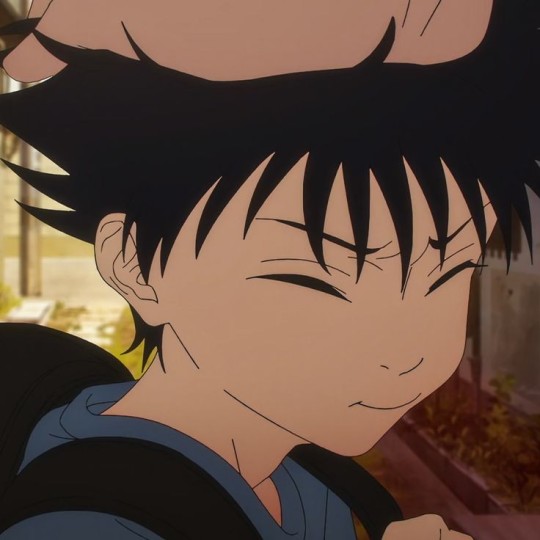
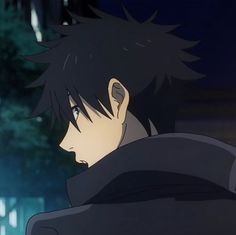
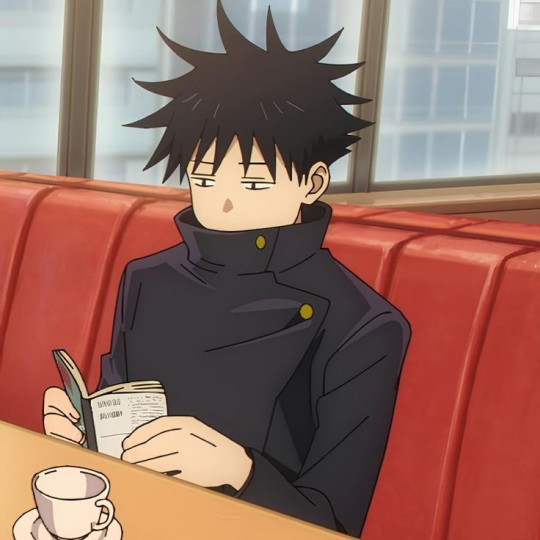
tune into megumi.fm ?
💗 about me
name: meg/megumi
age: 20+
pronouns: he/she/they
zodiac: ⊙ aries, ☽ sagittarius, ↑ libra
languages: english, hindi, korean (beginner)
🌙 interests
subjects (academic): structural biology, network theory, programming (mainly python, a little bit of R), organic chemistry, genomics
subjects (non-academic): mythology, etymology, literature, film studies and screenplay, animation
hobbies: reading, singing, dancing, listening to music, watching video essays on youtube
other interests: kdramas, jdramas, anime, kpop, indian classical music, indie games
📚 academic goals
- successful completion of my undergrad
- prep for MSc Computational Biology (+ living abroad)
- prep for future PhD
🦋 personal goals
- tracking my finances and learning to spend less
- learning to cook healthy food that I personally enjoy eating
- movement! learning lots of kpop dances
- reading lots of books, and exploring new genres
- developing a mini game using css and js
📍 navigation:
- Apr'24 Habit Tracker
- 2024 weekly tracker
- to-dos
- my art
- interactions with the besties
- 2023 daily tracker
#abt me <3#get to know me#digital journaling#introductory post#studyblr#study blog#bookblr#codeblr#desi studyblr#desi academia#stemblr#stem kid#megumi.fm#studyspo#studyblr intro post#studyblr introduction
77 notes
·
View notes
Text
I've been watching that Korean drama with the Autistic attorney, and what I like about it, is even when the plot is not at all about autism, it is still *about* autism. So far it seems like every episode tackles something different about life with autism.
Ep 1 finding a job is hard. Learning the social rules at new job is hard.
Ep 2 Becoming psychologically independent from your parents because their expectations from you don't match the real you, with two brief allusions to how clothing is hard for autistic people (both in social understanding and texture bad)
Ep 3 Autism is a spectrum but people with vastly different experiences with autism get grouped together anyway. A person seen as highly intelligent is actually struggling with school to the point of suicidality. People online give hate speech about autistic people and we just have to deal with it. Asperger's Nazi etymology.
Ep 4 How friendships form when you are Autistic. Being manipulated by the people you trust (especially family)
Ep 5 People lie, how to tell, and how to deal with it. Also the autistic character is seen as erratic to the point of being called "Wild Card."
Ep 6 Spending all your time trying to do something difficult only at the end having to have pointed out there was a much easier way. (Admittedly this a stretch. The episode seems more to set up drama about the main character's origins.)
Ep 7 Metaphors, figures of speech, all the non-literal language, and desperately trying to follow along and getting left behind. When someone else os just better than you and you can't possibly compare and have to work around awkwardly.
Ep 8 acting with integrity vs acting in a political manner. Being shielded from hard things as a form of infantilization.
Ep 9 Children get treated terribly but it's in a way that is supported by the current social systems so the harm isn't stopped at all despite people advocating for it.
Ep 10 People with developmental disabilities being infantilized and seen as completely incapable of having romantic or sexual relationships. Having a relationship with someone with someone with a developmental disability is assumed to be predatory and abusive.
But seriously I think it's really cool how it stays com topic" with autism while still doing other stuff. Like with episode 2 and 9, while there are clear parallels to autistic experiences, those experiences are not being sexperienced by our autistic character. This is still good and important, because autistic people are still human, and autistic experiences are part of human experiences.
I'm seriously would recommend any autistic person to watch it because it just feels so nice to be seen/represented. (Of course if you don't like it that's fine too.)
#autism#actually autistic#extraordinary attorney woo#neurodivergent#cw sui mention#i know there are more episodes but ep 10 was a lot. i'll add the rest later#cw sa mention
413 notes
·
View notes
Text
i dont know why james, sirius, and remus are all multilingual in my brain but they are.
sirius grew up speaking english, french, and korean. as a kid he was taught some latin and a proto-koreanic language for the sake of understanding magic, particularly spellcraft. at hogwarts he took one year of ancient runes. he cast in both latin and proto-koreanic, using proto-koreanic in duels because his opponents were less likely to understand it.
remus grew up speaking english and welsh. he also went to hebrew school but wasnt completely fluent. he took ancient runes for 5 years and used runic magic regularly. in casting he defaulted to latin, only using proto-celtic or hebrew spells if he didnt know latin alternatives, which was rare. he discovered that he mastered spells faster when he understood the etymology, so he taught it for each spell when he was a professor. (this prompted hermione to look up and note the etymology for any spell she struggled with for the rest of her hogwarts years)
james grew up speaking tamil and english. he was taught some latin and proto-dravinic before hogwarts, but not as much as sirius because the blacks had private tutors who focused on magic while james attended a small wizarding primary school that focused more on core subjects and muggle studies. at hogwarts he took 3 years of ancient runes. he cast in both latin and proto-dravinic.
#this ended up being longer than intended pls like it#hp worldbuilding#marauders era#sirius black#james potter#remus lupin#mwpp era#marauders#french sirius black#korean sirius black#indian james potter#tamil james potter#welsh remus#welsh remus lupin#jewish remus lupin
46 notes
·
View notes
Text
English localization of Zhongli’s and Nahida’s Archon titles, Genshin Impact Character Title Localization in General, and Zhongli’s title of Yanwang Dijun
I was reading the wiki page for the current Archons (and their names & titles) and the more I think about their titles the more I feel the English localization of Zhongli’s title is strange.
Here (just the ones from the five released regions):
.
Venti/Barbatos, Lord Barbatos, God of Freedom, Anemo Archon, of Mondstadt
Zhongli/Morax, Rex Lapis, God of Contracts, Geo Archon, of Liyue
Raiden Ei/Beelzebul, Raiden Shogun, God of Eternity, Electro Archon, of Inazuma
Nahida/Buer, Lesser Lord Kusanali, God of Wisdom, Dendro Archon, of Sumeru
Furina/Focalors, Lady Furina, God of Justice, Hydro Archon, of Fontaine
.
….face in hands. Why is Zhongli’s Archon title 岩王帝君 (Yanwang Dijun / Yan3wang3 Di4jun1) officially localized in Latin (with the meaning of King of Stone). Of course I’m used to seeing it because he’s consistently referred to as Rex Lapis in English, but if you really think about it:
“Hello, I’m a god in what’s basically a Chinese xianxia setting. I’m the god of stone and contracts, and I know a lot about the traditions of my nation, which is based on Chinese culture. For some time, I was seen as the leader or even emperor of my nation. I’m worshipped with a Latin title by my own people”
…
(I’ll explain the Chinese title’s meaning further below.)
-
Some time ago, I watched the first few minutes of the Sumeru Archon Quest in Japanese. Paimon mentions the Dendro Archon by title: クラクサナリデビ.
In romaji, this is Kura Kusanari Debi. (According to her wiki page, literally speaking, this title means Little Kusanali Devi.)
I can’t confirm its accuracy, but the etymology section of her page says this:
.
The name Kusanali likely refers to the Kusanāḷi-Jātaka, one of the poems within the Jātaka, a series of 547 Buddhist poems detailing the previous births of Buddha. The Kusanāḷi-Jātaka specifically details the encounter with a tree sprite.
"Kusanāḷi" itself is derived from the Pali words kusa ("kusa-grass," a sacred plant used in Hindu ceremonies) and nāḷi ("a hollow stalk or tube").
.
and
.
In Korean, the name is 쿠사나리 데비 Kusanari Debi. The word 데비 Debi derived from the Sanskrit or Pali word devī ("goddess" or "queen").
In Japanese, the name is クラクサナリデビ Kura Kusanari Debi, where デビ Debi may be of the same derivation as above, and クラ Kura may be derived from the Pali word khudda ("small", "inferior" or "low"). Kura may also be derived from the Persian word خدا Khuda ("Lord" or "God").
.
Genshin Impact doesn’t have Sanskrit as an available subtitle language but I wonder what would her title be in Sanskrit…? And if any of the official subtitle languages are similar to a theoretical Sanskrit title…
-
Oh, also, a note on character titles in Genshin Impact:
Since the original language is in Chinese, it seems most of the time a (non-Liyue) character’s Chinese title will not be a phonetic transcription. Instead, the Chinese title will be based on meaning, and the English localization will likely take that meaning and either localize it into English, or into the language “native” to the in-game region (and real-life culture).
For example, a Fontainian title, a Mondstadtian title, and a Liyue title would all have Chinese meaning in the Chinese version, but they’ll probably be localized into either English for all three, or French, German, and Chinese pinyin respectively (….or Latin. It’s not very consistent in Liyue) in the English version.
Here:
.
Lyney’s Chinese title (from his key visual) 惑光幻戏 (Magic of Puzzling Lights) is localized as “Spectacle of Phantasmagoria” in the English version, but theoretically they could also localize it into French as “Spectacle de fantasmagorie” (as it is in the official French version)
Albedo’s Chinese title 白垩之子 (Son of Chalk) is localized as the German “Kreideprinz” (Chalk Prince) but theoretically they could also could localize it into English as “Chalk Prince”
.
(What’s a good example for a Liyue character that doesn’t need extensive explanation on Daoism… Ah whatever. I’ll explain Zhongli’s own Archon title.)
.
Zhongli’s title as an Archon is 岩王帝君 (Yanwang Dijun, roughly meaning God of King of Stone). The first two hanzi characters mean stone and king (hence the English localization of Rex Lapis, Latin for King of Stone). But that lacks the nuance and cultural significance in the Chinese title.
.
帝君 (dijun) is (I believe…) a Daoist title of reverence added to a god’s name. So putting it together, 岩王帝君 can either be localized into pinyin as Yanwang Dijun (in a similar way that MDZS’s 夷陵老祖 Yiling Laozu is known as the Yiling Patriarch)… Or Lord Stone King if you really want but that has different religious connotations…
帝君 is similar to 真君 (zhenjun, another Daoist title for gods) which is often used for the Liyue 仙 (xian, localized as Adepti) characters. (In English, an adept, plural form adepts, refers to someone who’s very skilled at something. It seems in the game 仙 includes both Adepti with animal forms and Adepti with human forms, and 仙人 xianren specifically refers to Adepti who appear human, like Xiao.)
#Zhongli#Rex lapis#Yanwang Dijun#kusanali#lesser lord kusanali#nahida#archons#Genshin impact#Adepti#Liyue Adepti#岩王帝君#璃月仙家#原神#dusk analysis#Genshin translation#lyney#albedo#Little Kusanali Devi#English translation#fan translation
39 notes
·
View notes
Text
What if Anime Characters (Especially Japanese) have Chinese, Korean, and English names - Sarazanmai ver.
Those kanji names can be translated into Hanzi (Chinese) and Hangeul (Korean) based on en.wiktionary.org
1. Kazuki Yasaka (矢逆 一稀)

Etymology:
Kazuki's Kanji name (一稀) = 一 means "one"; 稀 means "rare/sparse/unique/thin"
* Chinese Name: 矢逆 一稀 (Shǐnì Yīxī) → If he has a Chinese name, I'll name him 石一稀 (Shí Yīxī).
* Korean Name: 시역일희 (Shiyeok Ilhee) → If he has a Korean name, I'll name him 석일희 (Seok Ilhee). Such a rare Korean surname due to match his Chinese/Hanja name)
* English Name: Based on one of his kanji names meaning, I'll name him Ace because Ace in Latin word means "one" (just like Kazu "一") or "unity". It’s often associated with intelligence or being the best since he is the protagonist of this anime. So, his English name is Ace Yasaka
2. Toi Kuji (久慈 悠)
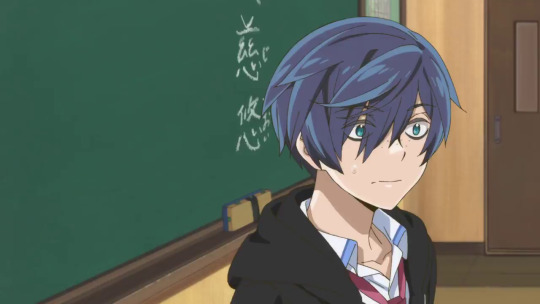
Etymology:
Toi's Kanji name (悠) = 悠 means "leisurely/ distant/ permanence/ eternity"
* Chinese Name: 久慈 悠 (Jiǔcí Yōu) → If he has a Chinese name, I'll name him 邱悠 (Qīu Yōu) (I can't find a Chinese surname that sounds like Jiǔ or Cí. I just have to find some surnames that sound almost the same as them (even though not very similar). But, reverse with Kazuki's, I want to match his Korean name 구 with a common Chinese surname that in Korean is read as 구).
* Korean Name: 구자 유 (Kuja Yoo) → If he has a Korean name, I'll name him 구유 (Goo Yoo).
* English Name: I'll name him Kian/Cian based on his kanji name meaning. Idk what kind of 1st alphabet I should use to name him? K or C? Just like the same case of Krystal/Crystal. Kian or Cian in Gaelic Irish given name means "ancient" but they also mean "distant", even "Grace of God". So, his English name is Kian Kuji/Cian Kuji.
3. Enta Jinnai (陣内 燕太)
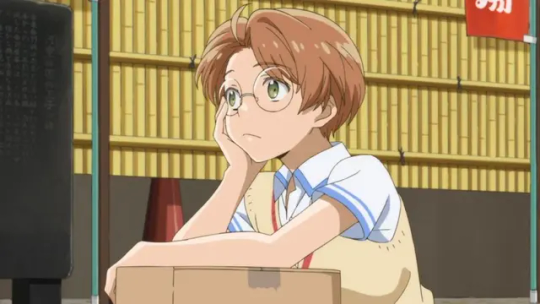
Etymology:
Enta's Kanji name (陣内 燕太) = 燕 means "Swallow"; 太 means "great"
* Chinese Name: 阵内 燕太 (Zhènnèi Yàntài) → If he has a Chinese name, I'll name him 陈燕太 (Chén Yàntài)
* Korean Name: 진내 연태 (Jinnae Yeontae) → If he has a Korean name, I'll name him 진연태 (Jin Yeontae)
* English Name: Based on one of his kanji names, I'll name him Howin in Chinese origin which means "a loyal swallow". So, his English name is Howin Jinnai
4. Reo Niiboshi (新星 玲央)
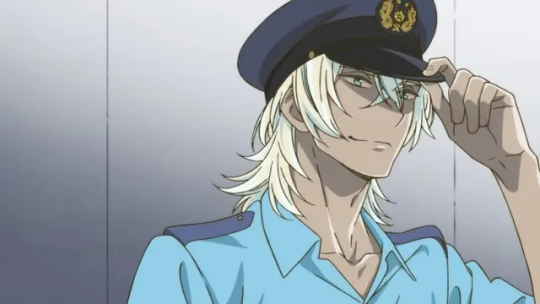
Etymology:
Reo's Kanji name (玲央) = 玲 means "tinkling of gem-pendants"; 央means "Central"
* Chinese Name: 新星 玲央 (Xīnxīng Língyāng) → If he has a Chinese name, I'll name him 辛玲央 (Xīn Língyāng)
* Korean Name: 신성령앙 (Shinseong Ryeong-ang) → If he has a Korean name, I'll name him 신령앙 (Shin Ryeong-ang)
* English Name: Since his kanji names are already in English but with some Japanese pronounciation (which 'L' is read as 'R'), So, his name is definitely Leo Niiboshi (also, his zodiac is Leo, right?)
Updated:
Sonething was wrong with the hangeul for 央. It must be 앙 (ang), not 영 (young). But... Yeah... It's too late, huh?
5. Mabu Akutsu (阿久津 真武)
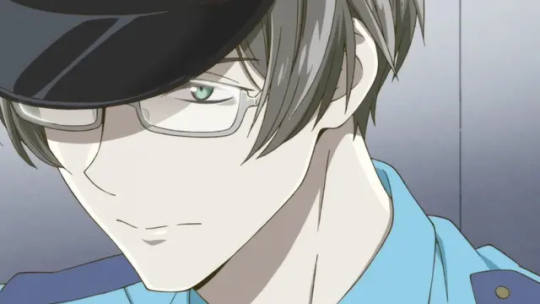
Mabu's Kanji name (真武) = 真 means "true, real"; 武 means "samurai, warrior, soldier"
* Chinese Name: 阿久津 真武 (Ājiǔjīn Zhēnwǔ) → If he has a Chinese name, I'll name him 金真武 (Jīn Zhēnwǔ)
* Korean Name: 아자진 진무 (Ajajin Jinmu) → If he has a Korean name, I'll name him 김진무 (Kim Jinmu) (Same case as Kazuki's, but this time, Kim 김 is the most common Korean surname).
* English Name: Based on one of his kanji names, I'll name him Miles because in Latin origin it means "soldier" but in English origin means "merciful". So, his English name is Miles Akutsu (Coincidentally, his 1st letter name is the same "M" as Mabu).
6. Sara Azuma (吾妻 サラ)
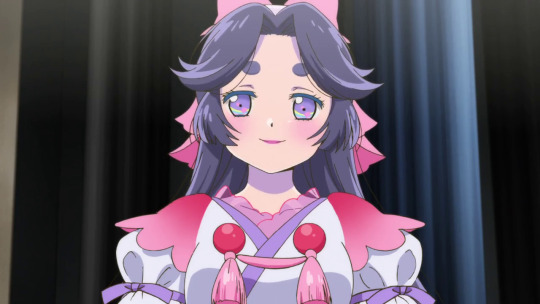
Sara doesn't have Kanji name because her name is in Katakana name. But, Sara (サラ/皿) means "dish".
* Chinese Name: 吾妻 沙罗 (Wúqī Shāluó) → If she has a Chinese name, I'll name her 吴沙罗 (Wú Shāluó)
* Korean Name: 오처사라 (Ocheo Sara) → If she has a Korean name, I'll name her 오사라 (Oh Sara)
* English Name: Don't ask it, it's definitely Sara Azuma. It's already English name.
7. Chikai Kuji (久慈 誓)
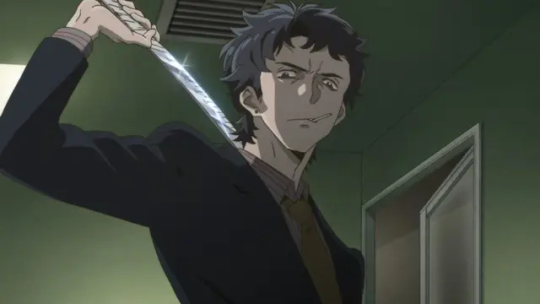
Chikai's Kanji name (誓) = 誓 means "oath/vow"
* Chinese Name: 久慈 誓 (Jiǔcí Shì) → If he has a Chinese name, I'll name him 邱誓 (Qīu Shì)
* Korean Name: 구자 서 (Kuja Seo) → If he has a Korean name, I'll name him 구서 (Goo Seo).
* English Name: Based on his kanji name meaning, I'll name him Arlan. The same origin as Toi's Kian/Cian, Arlan in Gaelic and Celtic (even in Hebrew) origin means "pledge or oath". So, his English name is Arlan Kuji.
8. Haruka Yasaka (矢逆 春河)

Haruka's Kanji name (春河) = 春 means "spring (season)"; 河 means "river"
* Chinese Name: 矢逆 春河 (Shǐnì Chūnhé) → If he has a Chinese name, I'll name him 石春河 (Shí Chūnhé).
* Korean Name: 시역춘하 (Shiyeok Choonha) → If he has a Korean name, I'll name him 석춘하 (Seok Choonha).
* English Name: Based on one of his kanji names, I'll name him Euell/Ewell (it is pronounced as [YOO-eh l] just like 'Yule Log' maybe). The meaning of Euell or Ewell in Old English origin is "Spring; source of a river". Same case with Toi, idk which letter should I choose to name? 'u' or 'w' for his English name? So, his English name is Euell Yasaka/Ewell Yasaka.
9. Otone Jinnai (陣内 音寧)
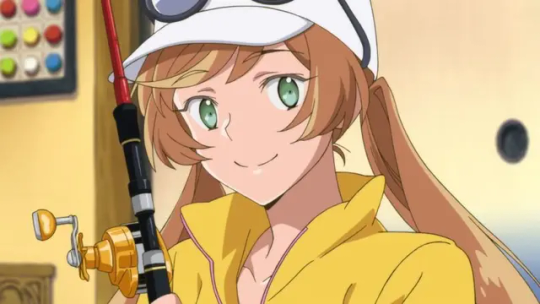
Otone's Kanji name (音寧) = 音 means "sound/voice/tone/timbre"; 寧 means "peaceful/tranquil/serene/rather"
* Chinese Name: 阵内 音宁 (Zhènnèi Yīnníng) → If she has a Chinese name, I'll name her 陈音宁 (Chén Yīnníng)
* Korean Name: 진내음영 (Jinnae Eumyoung) → If she has a Korean name, I'll name her 진음영 (Jin Eumyoung)
* English Name: Based on one of her kanji names, I'll name her Irene. Irene is a feminine name of Greek origin that means "peace", derived from the Greek word eirēnē of the same meaning. So, her English name is Irene Jinnai.
#sarazanmai#kazuki yasaka#toi kuji#enta jinnai#reo niiboshi#mabu akutsu#sara azuma#chikai kuji#haruka yasaka#otone jinnai#english names#korean names#chinese names#It's just for fun#so it's unofficial things#unofficial names#meaning names#anime
26 notes
·
View notes